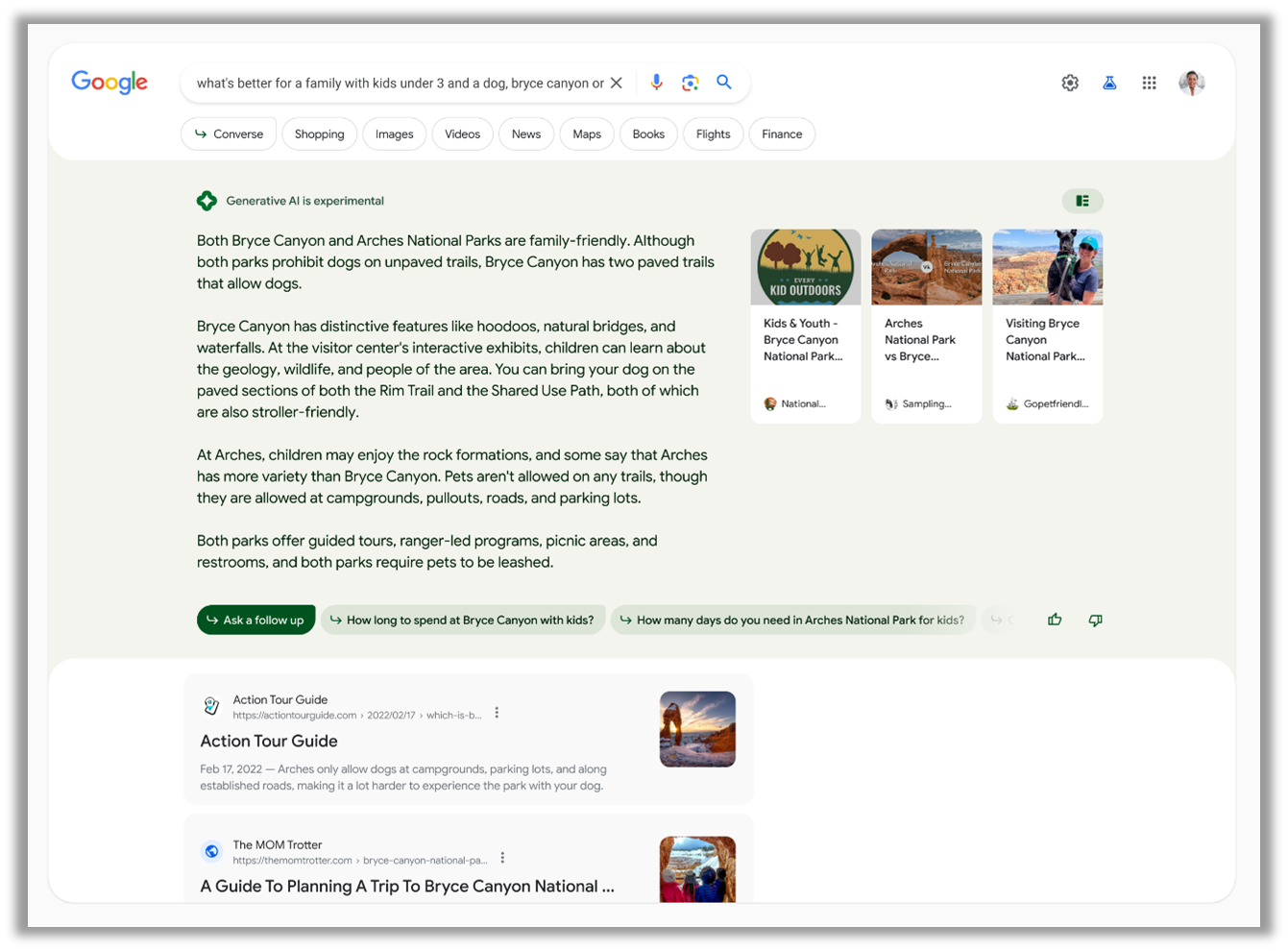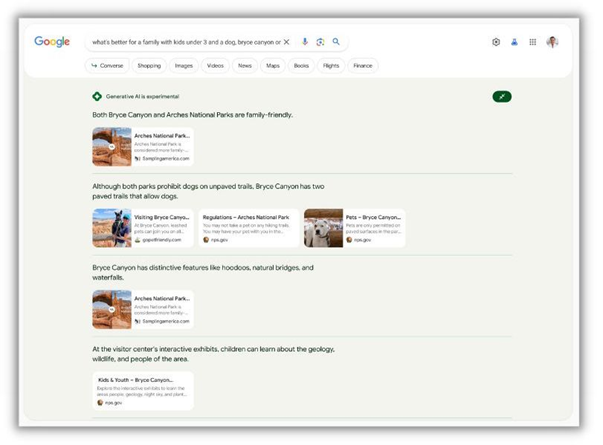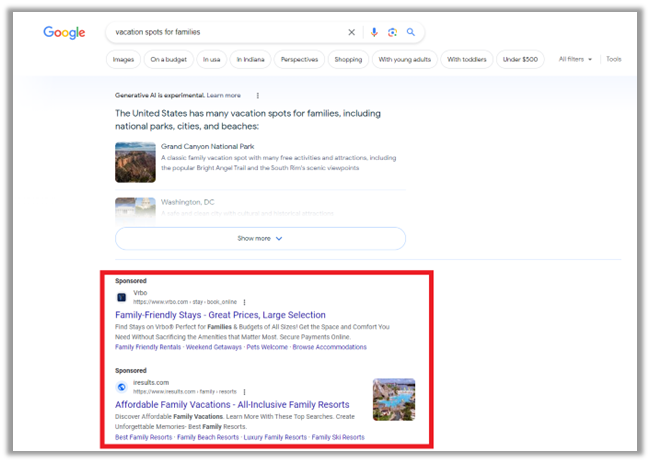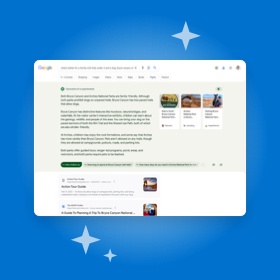Within a relatively short time, AI has revolutionized virtually every industry it’s been implemented in. From autonomous robotic arms in manufacturing that stack and assemble products to identifying and diagnosing diseases in healthcare, AI is quickly reshaping how we interact with the world. It’s no surprise then that the search engine millions of people use every day is the next stage for AI implementation.
Today, we’ll be looking at the AI-powered Search that Google is currently experimenting with – Search Generative Experience (SGE). What does this AI-integrated Search engine look like and how does it function? How will it change the search query and paid keyword ecosystem? Let’s dig into the future of search!

What is Google's Search Generative Experience?
Google’s Search Generative Experience uses AI to provide a summarized break down of information so you can find what you need faster. It’s like having an AI assistant that helps you surf the web and find what you’re looking for more efficiently. It’s part of the Google Search Labs experiments and can be used in two ways – in search results where it provides an AI-generated response to your search query at the top of the SERP, or while browsing where it’ll distill a page into key points that you can use to quickly navigate and search for information.
To spare my keyboard from typing all the words, we’ll be focusing on SGE in Search Results.
SGE in Action
In the following example from Google I/O 2023, Google VP of Engineering Cathy Edwards walked through a live example of SGE by searching for “what’s better for a family with kids under 3 and a dog, bryce canyon or aches”. Within seconds, the SGE results created a generative AI response that highlighted the unique features of both vacation destinations along with points to consider for the decision, all within the guidelines set in the search query.

In a traditional search, there’s a slim chance that the user would find a single source that compared these two location destinations, let alone taking the specific parameters ‘kids under 3 and a dog’ into account. You’d be browsing multiple sources using multiple searches to find the answer to your initial question. But with SGE, you get an auto-generated summary from relevant sources with a list of the ones used to generate the response so you can research them yourself.

If the AI-generated response didn’t quite provide the right information or left you with another question, you have the option to ask a follow-up question to get additional details without conducting a brand-new search.

It’s AI fully integrated into the traditional search results, and it has the potential to revolutionize how we find and discover information.
However, shifting to an AI-assisted search model comes with major potential shifts to the organic and paid search ecosystems.
SGE's Impact on Organic Search
The benefit of SGE is obvious, users can find answers to complex questions faster than traditional search. While some users will take the AI-generated response at face value, Google has stated that SGE is meant to be a “jumping off point” for exploring content and diving deeper into a topic. Google is attempting to create that diving board by providing the sources used to craft the AI-generated response in easy-to-navigate links so users can read about it themselves.
It’s reassuring to hear that Google isn’t trying to make traditional search obsolete by embracing an AI-only search engine. In its current state, I would question the effectiveness of a search engine solely powered by AI.
But regardless if users leverage those links or not, organic content that appears in this new search experience is pushed down the page to make room for the AI-generated responses. This makes high search rankings on SERPs even more valuable as users will have to scroll a bit further to read the organic results, making it less likely they'll see the results lower on the page. Those in the SEO space will either need to compete for those already competitive placements or try to cater their content to be cited in the AI-generated responses.
While it’s still too early to know for certain how websites can optimize their content to rank in the AI-generated results, some early speculations suggest writing content that’s ‘to the point’, informative, and directly addresses the queries input into the SGE. Of course, this doesn’t replace having a solid SEO strategy and building a reputable and credible website.
An AI-generated search experience will also change HOW people search for things online. Since loading your search query with the additional parameters surrounding your question (“family with kids under 3 and a dog” from the previous example) helps SGE provide a more relevant answer, users will likely load their initial search with all the conditions surrounding their question. This would shift the traditional search query from a single-question search (“Italian restaurants near me”) to a longer conversational style of search (“What are some Italian restaurants within a 15-mile radius that have gluten-free menu options”).
To leverage the full capability of SGE, we’ll likely see users shift to using unique long-tail search queries to generate more accurate AI responses.
SGE's Impact on Paid Advertising
Since the AI-generated response takes up real estate at the top of the SERP page, there’s speculation on how this will impact paid advertisers and their ad placements. The good news (or bad if you’re not a fan of paid ads) is that traditional search and shopping ads are eligible to appear above or below the AI-generated responses.

Seeing that paid advertising through Google Ads is a major revenue generator for Google, they have every reason to make advertising in the SGE seamless for both the advertiser and the end user. But with an AI-generated summary claiming space at the top of every user's search, I’d suspect there will be a negative effect on campaign performance to ads appearing in the SGE.
Currently, there is no unique placement selection or “opt-in” to have your ads appear in the SGE. In a tweet from the Google Ads Product Liaison, the ads that currently appear in the SGE are part of existing campaigns and are not a special campaign type. Google appears to be using the same ranking logic to decide when and where to show your ads in the SGE Results.
With no direct way to have ads appear in SGE (at least not currently) advertisers looking to rank for SGE searches could start gearing their ad text and keyword bids to long tail keywords. But as we talked about, users will likely include additional context in their SGE search query, making their searches even more unique. This will put a bigger emphasis on keyword research for any new campaign to ensure the bids are accurate and include SGE audience searches.
The “wishful thinker” in me hopes that Google makes it easy to control ad placements in this new experience. On top of that, having transparent reporting for ads served in SGE vs. traditional search would help advertisers determine the performance differences between the two placements. But something tells me that Google won’t make things too convenient for us and err on the side of ambiguity and retain control over when ads are served in the SGE.
As SGE continues to develop and becomes a polished product offering, it’ll be interesting to see what features Google rolls out (if any) to help marketers optimize their ads for this new AI-powered search experience.
When Will SGE Be Live?
As I am writing this blog, Google’s Search Generative Experience is still in the experimentation phase and not an official product offering. But if you’re looking to take SGE out for a test drive, you can click the Search Labs Beaker Icon in the top right corner of your browser and simply toggle it on.

While there hasn’t been a formal announcement on when Search Generative Experience will be released to the public, many believe that this will happen in the first half of 2024 ahead of Google I/O 2024.
Final Thoughts
AI continues to enhance various industries and services in a relatively short time. It’s only natural that one of the most popular search engines is the next subject for AI evolution. But as they say, you only have one chance to make a first impression. Before they make it official, Google needs to ensure that the information generated in the SGE is as accurate as possible, and provides proper citations that give credit to the sources used to generate responses, all while causing minimal disruption to the paid ads’ ecosystem.
For the sake of everyone who uses Google Search, I hope that Google takes its time to develop this new offering so it’s a welcomed next step in the evolution of search.




